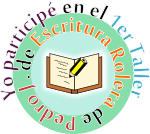http://vickid57.hubpages.com/hub/Tune-Your-Writing-Skills-by-Roleplay
Información:
Tune Your Writing Skills by Roleplay
The Journey of an Aspiring Writer
As an aspiring writer, I have used many methods to improve my skills. I have taken an online fiction writing course, purchased numerous how-to books, read writing periodicals and inspirational blogs by authors, purchased software to check my grammar, joined forums, and met a few published authors who have become mentors. I have learned an invaluable lesson on my journey. In order to grow as a writer, one must write consistently to improve and tone skills. It's like learning to play the piano. You need to practice each day. Unless you actually do it, you'll never develop. This is my confession. I love to roleplay. It is the one medium I have discovered that has immensely sharpened my quill, and I am about to share why.

Roleplay
About a year ago, I set up my first MySpace page, mainly for the purpose of advertising my blog. After spending months on the site and making various friends, I stumbled across a phenomenon. Since my focus was Phantom of the Opera, I found profiles that bore the characters names. Occasionally these pages were filled with writing and various story lines. Frankly, in my innocence, I didn't know what they were doing. After a little digging around, I discovered they were roleplaying.
A few sites caught my eye, and I was whirled into a story land created by various online authors. One person starts by sending what is called a "starter" to begin the story, and then your partner writes back continuing the story. It's a back and forth collaborate fiction effort. I was fascinated at this new medium.
Many roleplayers pick characters from movies, television, or fictional works. A player builds their own profile, which looks like a storyboard, and they write a bio on the character they are playing. Some roleplayers create their own characters out of their imaginations rather than using current works and find someone to write a new story.
Well, the whole thing fascinated me, and I decided to try it out. My entire purpose was to see if I had what it takes to write fiction. Frankly, I was petrified! I chose the character of Christine Daae from the Phantom of the Opera and found a Phantom and others who roleplayed the same story from the original version Leroux penned, as well as Webber's version. Starters came on my page, and it was my turn to post.
It was undoubtedly the most frightful writing experience of my life! As I look back upon my first post, as they call them, I was exposing my skills, or lack thereof, to another person and opening myself up for critique. It was not an easy task. However, as a result, a year later I can honestly say I have seen my fiction writing skills grow and mature into a readable and enjoyable work. In fact, it has given me much joy and a sense of accomplishment.
My Blog
- My blog deals with the story and the symbolism in the Phantom of the Opera. I started it just for fun, and 24,000 hits from 64 countries around the world, I am amazed at its success.
The Benefits of Roleplaying
What does roleplay do for you as an aspiring writer? Here are some benefits I have gleaned from the experience:
- Builds a Consistent Habit of Writing. It forced me to write. I was in essence bound to another writer or a group of writers waiting upon me to respond. When your writing partner(s) post, it's your turn. Most serious roleplayers like to keep the story moving along, so you know there's someone at the other end waiting to read your next post. Because I was obligated to another writer, it forced me to sit down and write on a regular basis.
- Challenges You to Develop Characters. It taught me to develop characters. Sure, I picked Christine Daae the opera singer, but in all reality I had to crawl into that woman's brain and body and act her life out from typing her story on the keyboard. It forced me to analyze my character's behaviors, thought processes, reactions, etc. It became an invaluable learning tool in character creation.
- Forces You to Think and Plot a Story. It forced me to plot. When you play with another individual or a group of individuals, it's great fun to plot and move the story along. It gets your creative juices flowing. You get to weave, direct, and plan the story as you move along, and so does your partner. Sometimes your plots get pushed aside because your partner has beat you to the punch and taken the story in another direction. You have to do some quick thinking and solve problems to move the storyline along. It's great satisfaction to throw a curve-ball at the person you're writing with as well.
- You Learn How to Research to Make a Story Realistic. It made me learn how to research background material. I threw myself into 19th Century France and suddenly I was learning French phrases and words, customs, manner of dress, and behavior in another century. Roleplaying turned me a history freak! I even played Katherine of Aragon, Henry VIII's first wife, and Joanna of Castile, who married Philippe the Handsome of Hapsburg. I'll admit I didn't have a clue about these individuals, but came across some serious roleplayers who are deep into history and can blow you off the page with details and background. My first gig as Joanna of Castile I was researching for hours about her life, her family, her kingdom, and husband. The experience was invaluable, as well as giving me a deep appreciation of who these women were that I played. Why? Because I had to crawl into their bodies and mind and write their lives. It was wonderful.
- Great Way to Meet Other Writers. You meet other writers like yourself. There are good writers who roleplay that are mature and wonderful, and there are young writers who are inexperienced, boring, and not so good. If you get into the right mix of people, you can meet friends, find mentors, have individuals critique your work; or, if you prefer, you can remain totally anonymous behind the quill, which many roleplayers prefer to do. You might be playing with a woman who is writing Henry VIII, or a man who is writing a woman's role. It's not unusual, but again, it tunes your character development.
- You Grow. My writing historically has been non-fiction. I can pen you an article about life and move you to tears, but don't sit me down to write about the roses sitting in the vase and describe the scene to you. This is where I lack. When I first started, I was pretty bad in this area. Now I can write a scene and tell you about the room, the roses, the body language, the facial expressions, and make it come alive. It has helped me grow immensely in these areas.
How Does it Work?
So you might be asking how does this all work. Well, it's pretty basic. You choose a character to play, and then find another character to play with or a group of individuals in what's called a roleplay group where many play on the same page and write the story. Here are the basic rules of roleplay:
- When you post your part of the story, you are not allowed to think, speak, or move another person's character. You can only write from your character's perspective, and the person you play with can only write from theirs.
- Most players agree that you cannot kill their character, or disable them physically in any way. However, if you want your character to have an accident, and end up in a wheelchair, that's your call.
- Most players prefer to remain anonymous. You have the right not to reveal your identity, where you live, or talk to anyone about your personal life. If you're playing with someone you know, that's fine. It's fun, but you still have to be safe. Be wise on how you handle that portion.
- Write well. Serious roleplayers want quality work. No typos, good grammar, etc. Most post rules, as well, regarding what they will accept or not accept when they roleplay with you. Some inexperience roleplayers only post a paragraph. Others write what is termed multi-paragraph or novella posts. I tend to stay with the multi-paragraph and novella crowd.
The Lingo
Every hobby has lingo, and so does roleplay. Here's a few:
- OOC - Means "out of character." Sometimes you want to speak as yourself and not from your character to another player. If you do, people will write OOC to differentiate between the two.
- IC - Means "in character." Obvious, it's the opposite of the above. You're speaking from your character.
- RL - Means "real life." We all have one.
- OOC Drama - "Out of character drama." Is everyone mature that roleplays? No, there are a lot of teenagers and young immature adults that can cause problems over being jealous with your character to being mad at you for no reason.
Other terms:
- Posts - It's that part of the story you post for your partner to read.
- Blacklist - I hate to say it, but some groups "blacklist" undesirable players due to too much out of character drama. It's sort of a warning system to beware of certain individuals.
- It's NOT Real - A good term to remember is, "It's not real, it's only roleplay." Sometimes you can take things a bit too seriously. You are not really the Queen of England, so stop acting like one. The player on the other end really doesn't love you, they love your character. It's not really the mean mother-in-law at the other end who despises you for marrying her son, it's just another player, so don't take it personally. Keeping the lines between play and reality are important. Keep a level head. "IT'S NOT REAL PEOPLE, IT'S ONLY ROLEPLAY."

Vicomte de Chagny's Paris Estate Roleplay Group
A Place to Try It Out
Do you want to try it out? Well, there are plenty of places to write in the roleplay world. There are groups on Facebook, Yahoo, MySpace, Blogger, and even websites dedicated to certain themes. If you are a serious writer, be selective where you choose to write.








No hay comentarios:
Publicar un comentario